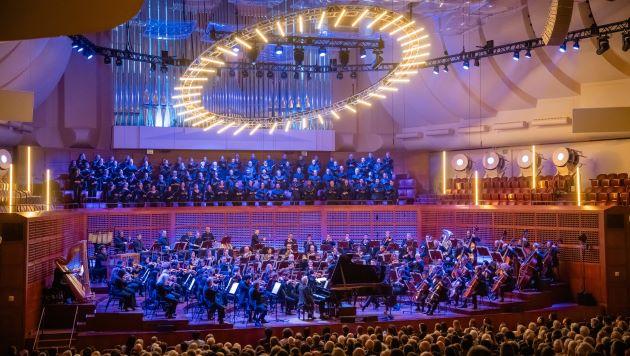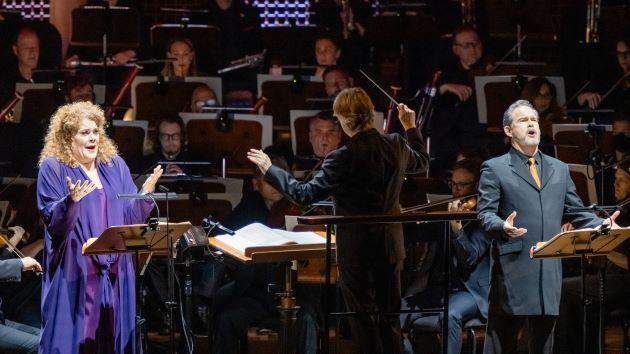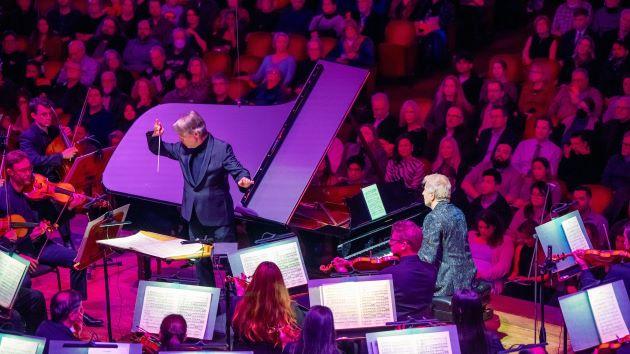
Duke Bluebeard’s Castle, Béla Bartók’s only opera, is an outstanding score. But the story can feel flimsy, as if in successive handoffs of the plot — from the Charles Perrault fairytale through Maurice Maeterlinck’s Symbolist play to Béla Balázs’s Hungarian libretto — it shrank.
Not on Friday at Davies Symphony Hall. From the opening narration, written in an archaic rhetorical Hungarian whose somewhat hobbling English translation Breezy Leigh carried with aplomb, the San Francisco Symphony’s performance, conducted by Esa-Pekka Salonen, was characterized to perfection.
Then come the doors: Judith opens each one to reveal the splendor behind, and, as in an aria, the action suspends. Blood everywhere. Her revelation becomes a ritornello, constantly recurring; you hope she’ll catch on and escape while she still can.
Bluebeard, for his part, is often less a person than a gargoyle. That’s how baritone Gerard Finley played it — at first. Then, he began to pull his syllables, his voice growing husky with emotion. You could sense the Duke’s remorse. Of course he has a heart: why else would Judith love him?

She’s no naïf, when mezzo-soprano Michelle DeYoung is singing. From the first door, which she asked to open “gently, gently,” to the last, whose opening she commanded, DeYoung, a consummate artist (resplendent also in Mahler’s “Resurrection” Symphony last season), guided the drama, with unerring pitch to boot.
Salonen and DeYoung have made a live recording of the piece, but experiencing the performance up close was a revelation. The tremendous organ chorale, where the leaping bass line of root-position chords measure the breadth of the couple’s domain, is the opera’s apex: it is impressive in headphones, but in a hall flooded with light, the highlight of your year. It was, in a way, appropriate when the orchestra drowned out the lower notes especially of Finley (who isn’t easily overpowered). Judith is doomed, but the Duke, too, is lost. That’s the tale’s tragic moral: to know someone fully is a heavy burden. At the time he decided to write the opera, Bartók was only 30, and newly married. Was love already not enough?
Alexander Scriabin was in his late 30s when he wrote Prometheus: The Poem of Fire. But the work conveys the passion of a younger man. The composer transmits not the myth of Prometheus so much as the fire burning in him.
It’s an erotic piece, certainly, for a composer whose artistic sensibility concerned a larger coming together. Scriabin longed to achieve a kind of total music, or Gesamtkunstwerk, which pushed beyond sound to include the other senses. One such project was Mysterium, a ritualistic week-long performance that was to take place in the Himalayan foothills. Alas, Scriabin died too young — at 43, of an infection — to realize his vision.
While he lived, Scriabin ached to express everything. Prometheus instructs the musicians to play flamboyantly, with rapture, even “voluptuously, almost with pain,” to name a few moods, the slower and softer of which didn’t quite come off on Friday. And without the threat of extinguishment, what’s the pleasure of watching a fire?

But I suspect that the crowd braved the rain less in anticipation of hearing Scriabin’s score come alive at SFS for the first time since 1971 than for the multisensory experience. Promoted in an aggressive marketing campaign, the spectacle included lights (designer Luke Kritzeck) and, in collaboration with Cartier (perfumer Mathilde Laurent), scent.
The score, in fact, is for an orchestra of moderate size, augmented by piano (Jean-Yves Thibaudet) and, in a final thrust, choir (the SFS Chorus, directed by Jenny Wong). But Scriabin’s white whale was the tastiera per luce, a rainbow light-up keyboard that, during the composer’s lifetime, was only approximated. Directors have dreamed up lighting schemata for the piece ever since. Under the colossal ring of Kritzeck’s design gleamed the faces of players you might not otherwise have noticed — a violist sitting fourth chair, for example — in pretty chiaroscuro. On the other hand, the pitch-black opening only spoiled the downbeat.
Visuals, at any rate, can be tuned out. Scents, not so much. At choice moments, notes of citrus and musk spurted from diffusers hidden under the seats, and, flanking the stage, stubby cannons shot loads of fog. Like a military parade — or milling about the cosmetics counter at Nordstrom. Scriabin, anyhow, would have been ecstatic.

